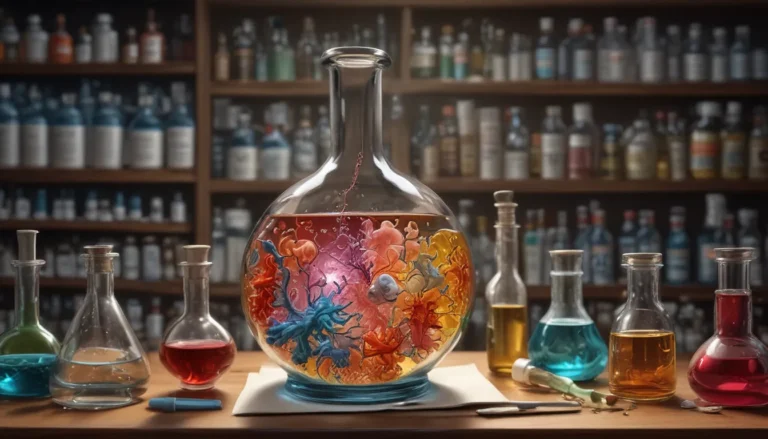A Note About Images: The images used in our articles are for illustration purposes only and may not exactly match the content. They are meant to engage readers, but the text should be relied upon for accurate information.
Welcome to the intriguing realm of oxidation, a fundamental chemical process that influences everything from the browning of apples to the rusting of metals. While oxidation may seem commonplace, its impact extends far beyond surface-level reactions. Join us on a journey as we uncover 19 unbelievable facts that showcase the significance and versatility of oxidation in our daily lives.
Exploring the Basics of Oxidation
Oxidation is a chemical process characterized by the loss of electrons from a substance. While it is commonly associated with the reaction between a substance and oxygen, oxidation can also occur with other elements or compounds. This fundamental process plays a crucial role in various contexts, from biological functions to industrial applications.
The Dual Nature of Oxidation
Oxidation exhibits a duality in its effects, where it can be both beneficial and harmful. While essential for processes like cellular respiration and energy generation, oxidation can also lead to the degradation of materials and the aging of living organisms. Maintaining a delicate balance between these contrasting aspects is vital for overall well-being.
Unveiling the Impact of Oxidation
- Oxidation is like a superhero with a double-edged sword, shaping our world in surprising ways.
- It acts as a hidden ingredient, adding flavor and complexity to our surroundings.
Powering Cellular Respiration
In the realm of biology, oxidation of glucose molecules plays a pivotal role in generating energy in the form of ATP. This essential process fuels the functioning of cells and organisms, highlighting the intricate interplay between oxidation and cellular activities.
Witnessing the Browning Phenomenon
When fruits undergo oxidation due to enzyme-catalyzed reactions, they turn brown upon exposure to air. This natural process is commonly observed in fruits like apples and bananas, showcasing oxidation’s influence on the visual appeal and freshness of produce.
Driving Energy Production in Batteries
The oxidation-reduction reactions in batteries, including those used in electronic devices, enable the flow of electrons and the generation of electrical energy. This practical application of oxidation underscores its role in powering modern technologies.
Tackling Free Radicals with Antioxidants
Oxidation reactions can produce free radicals, highly reactive molecules that have the potential to damage cells and DNA. Antioxidants act as protective agents by neutralizing these harmful compounds, emphasizing the importance of maintaining a balanced oxidative environment.
Transforming Food through Oxidation
The color and flavor of food can be altered through oxidation reactions involving specific compounds. Whether it’s the browning of cooked meat or the maturation of wine, oxidation plays a key role in enhancing the sensory experience of consuming various foods.
Harnessing Combustion for Energy
Combustion, a rapid oxidation reaction that occurs when a fuel combines with oxygen, serves as the foundation for energy-producing systems like internal combustion engines. This process exemplifies how oxidation can be harnessed to drive essential functions in modern society.
Nurturing the Immune System
Certain white blood cells release reactive oxygen species during the immune response, aiding in the body’s defense against pathogens and foreign substances. This reliance on oxidation underscores its crucial role in supporting the immune system’s protective functions.
Preserving Artistic Elements
Exposure to oxygen and other oxidizing agents can lead to the fading of dyes and pigments in textiles, paintings, and other colored materials. Understanding the impact of oxidation on artistic creations highlights the need for conservation and preservation efforts.
Unveiling the Origins of Fire
Spontaneous combustion reactions resulting from the oxidation of materials at high temperatures can lead to the release of heat and the risk of fires. Examples include oily rags or certain chemical compounds, highlighting the inherent combustible nature of oxidation processes.
Enhancing Material Properties through Oxidation
Controlled oxidation processes are instrumental in the production of metal alloys, improving their hardness, strength, and corrosion resistance. This utilization of oxidation underscores its role in enhancing the mechanical properties of materials for various applications.
Promoting Environmentally Friendly Practices
Oxidation processes, such as using chlorine or ozone, play a crucial role in wastewater treatment by breaking down organic pollutants and disinfecting water. These eco-friendly practices demonstrate how oxidation can be leveraged to promote environmental sustainability.
Addressing the Consequences of Plastic Degradation
Exposure to oxygen and other oxidative agents can lead to the breakdown and degradation of plastic materials over time. Understanding the mechanisms of oxidation in plastic degradation underscores the importance of responsible waste management practices.
Unraveling the Diversity of Oxidation Processes
While often associated with oxygen, oxidation can occur without its presence through chemical reactions involving other oxidizing agents like chlorine. This versatility highlights the broad spectrum of oxidation processes that can influence diverse chemical transformations.
Embracing Innovation in Papermaking
Oxidation processes are essential in the production of paper and pulp, where they facilitate the removal of lignin from wood fibers. This strategic application of oxidation underscores its role in enabling efficient and sustainable manufacturing practices in the paper industry.
Aging Wine Gracefully through Oxidation
In the art of winemaking, oxidation reactions during aging contribute to the development of complex flavors and aromas in wine. This meticulous process highlights the deliberate utilization of oxidation to enhance the sensory characteristics of a beloved beverage.
Accelerating Oxidation: Factors at Play
External factors such as heat, light exposure, and catalysts can accelerate oxidation reactions, leading to faster degradation or chemical changes in substances. Understanding the influence of these variables on oxidation dynamics provides insights into managing and controlling oxidative processes.
Unleashing Your Curiosity on Oxidation
These 19 astonishing facts about oxidation showcase its diverse and profound impact on our daily experiences. From fundamental biological functions to industrial innovations, oxidation permeates various aspects of our lives, shaping the world around us in unexpected ways. By exploring the intricacies of oxidation, we gain a deeper appreciation for its role in chemistry, biology, and environmental sciences.
Concluding Thoughts on Oxidation’s Influence
Oxidation reigns as a captivating chemical process that leaves an indelible mark on our world. From sparking fires to preserving artistic creations, its effects resonate across diverse domains, underscoring its integral place in our lives. As we unravel the mysteries of oxidation, let us embrace the complexity and wonder of this fundamental process that illuminates the interconnectedness of our natural and technological landscapes.
Unveiling Further Insights into Oxidation
Expand your knowledge and curiosity by exploring oxidizing agents’ enigmatic world, where chemical reactions come alive. Delve into the fascinating realms of oxidative stress, antioxidants’ protective powers, and beta-oxidation’s energy-generating mechanisms. Each facet of oxidation offers a captivating lens through which to perceive the intricate web of chemical interactions that shape our existence. Dare to delve deeper into the multifaceted nature of oxidation and discover new realms of understanding and appreciation.
Delve into the Intriguing World of Oxidation
As you embark on your exploration of oxidation, remember that each discovery contributes to a richer tapestry of knowledge and insight. Embrace the complexity and elegance of oxidation as it unfolds before you, revealing the profound impact of this fundamental process on our world. Whether you are a budding scientist, a curious enthusiast, or a lifelong learner, the world of oxidation invites you to unravel its mysteries and appreciate its significance. Let your journey into this captivating realm spark your imagination and deepen your understanding of the remarkable influence of oxidation in our lives.
FAQs
Q: What is oxidation?
A: Oxidation is a chemical process involving the loss of electrons by a substance, leading to changes in its chemical properties and often accompanied by the release of energy.
Q: How does oxidation affect our health?
A: Oxidation can result in the formation of harmful free radicals in the body, which may damage cells and contribute to various diseases. Antioxidants play a critical role in neutralizing these free radicals and safeguarding our health.
Q: Is oxidation always negative?
A: While oxidation is often associated with negative effects like corrosion and decay, it is vital for natural and industrial processes, including nutrient metabolism and energy production.
Q: How do scientists study oxidation?
A: Scientists employ various experimental techniques to study oxidation, such as monitoring changes in oxidation states, measuring reaction rates, and analyzing the products produced during oxidation reactions.
Join Us in Exploring the Wonders of Oxidation
Our commitment to delivering engaging and informative content is grounded in a dedication to sharing credible and accurate facts with our community. Every insight and discovery is made possible by contributors like you, who bring a diverse range of perspectives and knowledge to our platform. Trust in our mission to offer quality and authenticity as you delve into the fascinating world of oxidation and uncover the mysteries waiting to be revealed.






